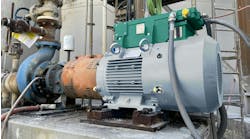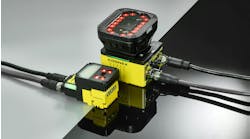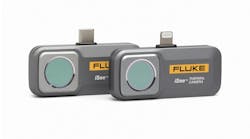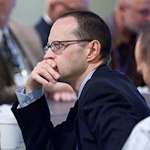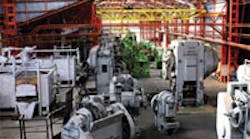The name “Finkl” looms large in the history of U.S. manufacturing, thanks to the specialty and tool steelmaker and open-die forging enterprise known as A. Finkl & Sons, founded 135 years ago and operating still in Chicago.
But the next phase of its history will involve a larger organization with a wider presence and a new name—Finkl Steel.
That is the identity adopted by a new consortium of open-die forgers, with Composite Forgings Ltd. of Detroit, and Quebec-based Sorel Forge Co. joining the Finkl family.
“This is really all about bringing value to our customers,” explained Finkl Steel CEO Mark Shirley, in an interview.
“We think that we can improve our sales force effectiveness by leveraging the product line of each of the three businesses and having one face to the customer.”
In addition to customer service, Shirley said “putting the businesses together” would improve “product support from a technical standpoint,” meaning new product development, product quality, and process development.
Shirley also noted that the three forgers’ customers would see other benefits.
“Product availability is probably one of the biggest advantages that we think we’ll see…(with) two fully integrated plants (both the Chicago and Quebec plants have electric melting, refining, and degassing capabilities), and Composite complements with capability in smaller products, bringing that strength to the group.”
He said Finkl Steel would be able to optimize ‘plant loading’ and product mixes at each plant, to improve lead times and “delivery reliability.”
All three forging operations are owned by the Schmolz + Bickenbach Group, based in Düsseldorf, Germany, and operating mainly as a global distribution network for stainless and tool steels. The North American arm of the S+B distribution network will remain independent of Finkl Steel, which will source most of its forging raw materials from its own melt shops—though Shirley indicated those operations will sell mold steel mainly through the S+B network.
The name of the new organization is intended to capitalize on the high recognition of the Finkl name, and to emphasize the group’s availability to supply a range of high-quality materials according to customers’ requirements. In addition to its manufacturing capabilities, Finkl has 18 metallurgists and a wide range of manufacturing and marketing expertise on its staff.
The group lays claim to over 100 patents for steel grades and steelmaking technologies.
While all three plants are primarily open-die forging operations, Shirley said that might be a detail open to an evaluation in the future of Finkl Steel.
“Really, with Finkl Steel forming, we’re going to basically take a whiteboard of our strategy for going forward, and that strategy will be dictated and steered by where our customers would want to take us.”
That may entail new capital investments or acquisitions, he allowed. Shirley confirmed the group has “some smaller capital programs going on here in 2015, (and) Shmolz + Bickenbach, as a corporate parent, has been very interested in supporting our growth efforts here in North America.”




